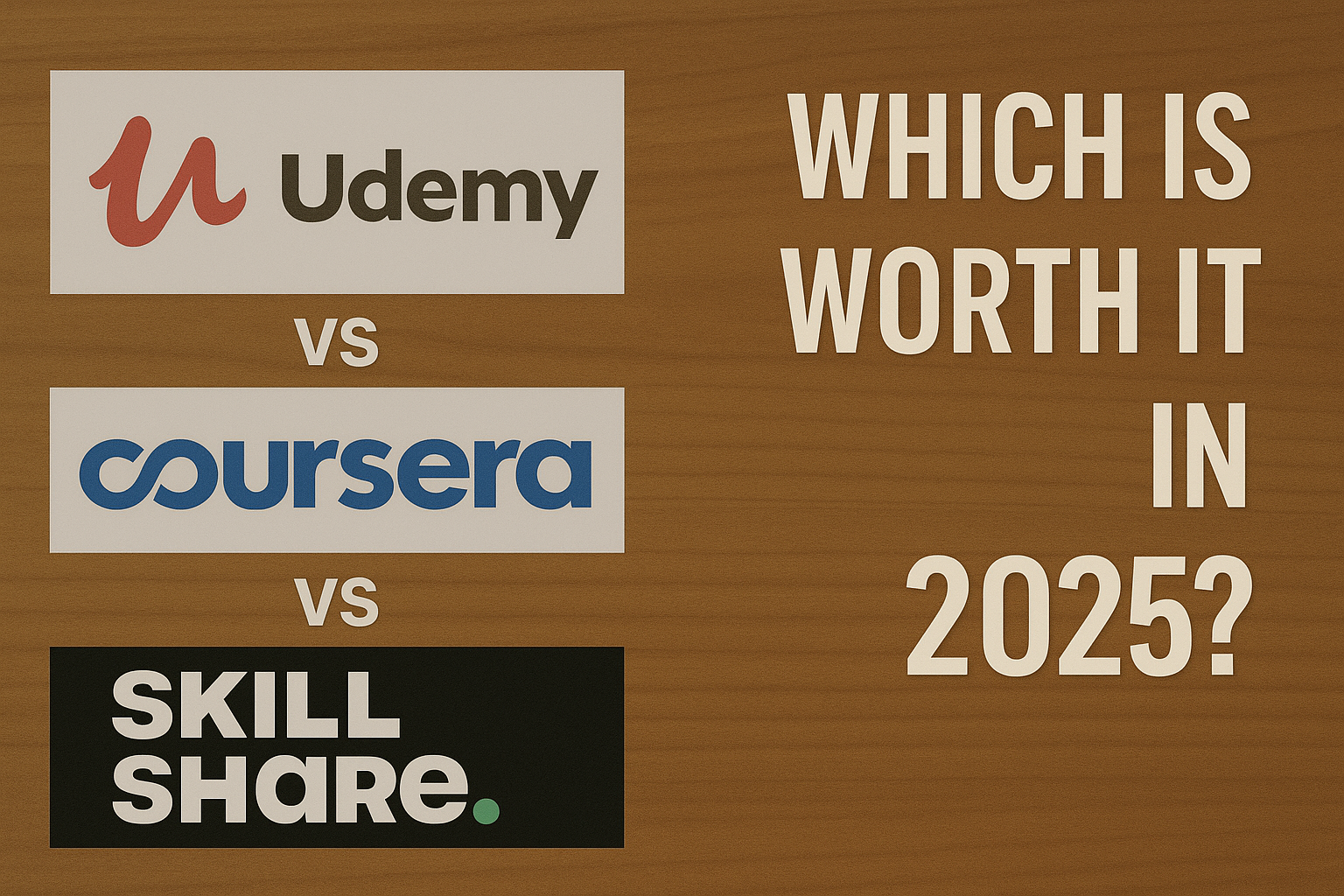Introduction: Why This Comparison Still Matters
The online learning boom has settled, and in 2025, the question isn’t if you should learn online, but where you’ll get the best return on your investment. Today’s learners expect real results—a promotion, a new career, a standout portfolio, or a valuable new skill.
Three platforms dominate the landscape, each with a different approach. This guide breaks down the big three for U.S. learners: Udemy, the sprawling skills marketplace; Coursera, the digital arm of the university world; and Skillshare, the hands-on creative workshop. We’ll look at their current business models and what they offer so you can make a smart decision about where to invest your time and money.
How to Pick the Right Online Learning Platform
Before we dive in, think about what matters most to you. Use these questions to guide your decision:
- What’s the real cost? Is it a monthly subscription or do you buy courses one by one? How do sales and free trials affect the final price?
- Will this help my career? How much weight does a certificate carry with U.S. employers? Is it a university-backed credential or a simple badge of completion?
- Is the content any good? An open marketplace offers endless variety but quality can be a gamble. A curated platform offers reliability but less choice.
- How do I like to learn? Do you prefer a structured, academic-style course with deadlines, or a flexible, self-paced class you can fit into your schedule?
The Three Contenders: A Deep Dive
Udemy: The “Something for Everyone” Marketplace
Think of Udemy as a giant online mall for courses. It’s an open marketplace where experts on almost any topic can create and sell a course. This has created a massive library of over 210,000 courses, making it the largest and most diverse platform available.
Recent financial reports show Udemy is focusing heavily on its corporate training product, Udemy Business. While its consumer side remains a vast marketplace, the most polished and curated content is often reserved for its business clients. For you, the individual learner, this means it’s more important than ever to read reviews and choose carefully.
U.S. Pricing (2025):
- Pay-Per-Course: Udemy’s signature model is “lifetime access” to individual courses. List prices can be up to $199.99, but a word of advice: never pay full price. The platform runs constant sales, making most courses available for $10-$20.
- Personal Plan Subscription: If you prefer an all-access model, the Personal Plan costs around $20 per month (or an annual equivalent of $16.58/month). This gives you access to a curated collection of over 11,000 of Udemy’s top courses.
The Bottom Line:
- Strengths: Unbeatable variety, super affordable for picking up specific skills, and lifetime access to courses you buy. It’s perfect for self-paced learning on a busy schedule.
- Limitations: Course quality is all over the map. You have to sift through reviews to find the best ones. Most importantly, Udemy’s certificates of completion are not accredited and hold very little weight with U.S. employers.
Coursera: The University Experience, Online
Coursera is the opposite of Udemy. It’s a curated platform that partners with over 350 top-tier universities (like Yale and Duke) and industry leaders (like Google and IBM) to offer courses, certificates, and even full degrees. The focus here is on quality, structure, and credentials that count.
With 183 million learners, Coursera is growing fast. In 2025, the platform has shifted to integrating its courses directly into university programs for academic credit. This move makes its top certificates even more valuable, creating a clear path from an online course to a formal degree program.
U.S. Pricing (2025):
- Audit for Free: You can watch most course lectures for free by choosing the “audit” option. You just won’t get graded assignments or a certificate.
- Get a Certificate: To earn a certificate for a single course, it typically costs $49-$99.
- Specializations & Professional Certificates: These multi-course programs run on a subscription model, usually $49-$79 per month. The faster you finish, the more you save.
- Coursera Plus: For unlimited access to over 10,000 courses and certificates, the subscription costs $59 per month or $399 per year.
- Degrees: Formal MasterTrack Certificates and degrees range from $2,000 to over $50,000.
The Bottom Line:
- Strengths: High-quality, academically sound content from brands employers trust. Its Professional Certificates from partners like Google and IBM are highly respected micro-credentials in the U.S. job market.
- Limitations: It’s more expensive than its competitors. The academic structure, with deadlines and graded work, requires a real time commitment.
Skillshare: The Creative’s Workshop
Skillshare has carved out a niche by focusing on creative and artistic skills. Its entire platform is built around one simple, effective idea: learning by doing. Every class includes a project, creating a community of active makers who share their work and give feedback.
In 2025, Skillshare appointed a new CEO and has started exploring new revenue streams, including listing some courses on Coursera and pursuing AI content licensing deals. While this might signal market pressures, its core offering remains a fantastic value for its target audience.
U.S. Pricing (2025):
- Annual Subscription Only: Skillshare offers a single, all-access plan. It costs $167.88 per year, which works out to about $13.99 a month but is billed upfront.
- No Single Courses: You can’t buy courses individually; it’s a subscription-only service.
The Bottom Line:
- Strengths: Perfect for hands-on, project-based learning in fields like graphic design, illustration, and video production. The community feedback is a huge plus for creative growth. The subscription is a great deal if you plan to take several creative classes.
- Limitations: The platform offers no formal certificates, so it’s not for resume-building. The course library is heavily focused on creative topics, with few deep technical or academic subjects.
Side-by-Side Comparison: Udemy vs. Coursera vs. Skillshare in 2025.
Which Platform Is Best for Your Goals?
You Want to Land a New Job or Get Promoted
Coursera is the clear winner. Its Professional Certificates from Google, IBM, and Meta are seen as legitimate industry credentials by many U.S. employers. The structured curriculum and graded projects provide proof that you have the skills for the job.
Udemy is a great, low-cost supplement. Use it to master a specific tool mentioned in a job description, like a niche programming language or software like Asana or Jira.
####…You’re Building Creative or Artistic Skills
Skillshare was made for you. Its project-based model is the best way to learn a creative skill because it forces you to actually create something. The community feedback helps you improve and build a portfolio to show clients or employers.
Udemy is a strong alternative for technical creative software. If you need a deep, multi-hour masterclass on a specific program like Blender or advanced Photoshop techniques, Udemy often has more in-depth options.
####…You’re Learning a New Hobby
Udemy’s pay-per-course model is ideal. Want to learn to bake bread or play the guitar? Buy one high-quality course for $15 during a sale and you’ll have it forever, no subscription required.
Skillshare is a great value if your hobbies are all creative. For about $14 a month (billed annually), you can explore photography, creative writing, and illustration all at once.
The Savvy Learner’s Playbook: How to Get the Most for Your Money.
- Audit and Trial Everything First. On Coursera, you can watch almost all the video lectures for free using the audit mode. Only pay for the certificate once you know the course is a good fit. Use the 7-day free trials for Coursera Plus and Skillshare to explore before you commit.
- Never Pay Full Price on Udemy. Seriously. Add courses to your wishlist and wait for one of the near-constant sales. The real price for almost any Udemy course is under $20.
- Avoid Subscription Overload. Paying for both Coursera Plus ($399/year) and Skillshare ($168/year) is rarely a good idea. Pick one based on your main goal for the year and supplement with cheap, individual Udemy courses.
- Mix and Match Platforms. The best strategy is to use each platform for its strengths.
- Tech Career Example: Earn a foundational Coursera Professional Certificate (like the Google Cybersecurity one). Then, use Udemy to learn specific tools (like Wireshark or Metasploit) that show up in job postings.
- Creative Career Example: Use a Skillshare subscription for ongoing practice and portfolio projects. Then, buy a deep-dive Udemy masterclass from a top designer to learn their professional workflow.
FAQ & Final Thoughts
Frequently Asked Questions (FAQ)
Are Coursera certificates actually recognized by employers?
Yes, especially the Professional Certificates from big names like Google, IBM, and Microsoft. They are widely seen as credible proof of job-ready skills and are a great addition to a resume.
Can a Udemy certificate get me a job?
Unlikely. The skills you learn are valuable, but the certificate itself holds almost no formal weight with U.S. employers. Think of it as a personal accomplishment, not a professional credential.
Which is better for tech skills, Udemy or Coursera?
For a recognized credential that will get your resume noticed, Coursera is better. For learning a very specific tool or programming language quickly and cheaply, Udemy often has more options.
Is Skillshare worth it without a certificate?
Yes, if your goal is building a creative portfolio. For designers, artists, and photographers, a strong portfolio is much more valuable than a certificate of completion.
How often is course content updated?
It varies. On Coursera, industry-partnered content is updated regularly, while university courses may be refreshed less often. On Udemy, it’s up to the individual instructor. As a rule of thumb, content in fast-moving fields should be updated every 6-12 months.
The Final Verdict
Choosing between Udemy, Coursera, and Skillshare comes down to a simple trade-off.
- Go with Coursera when you need a credential.
- Go with Udemy when you need a specific skill.
- Go with Skillshare when you need to build a portfolio.
In 2025, the smartest learners don’t pick just one platform. They mix and match, using the unique strengths of each to build a personalized and affordable education. Now you have the framework to do the same.





Leave a Comment
You must be logged in to post a comment.